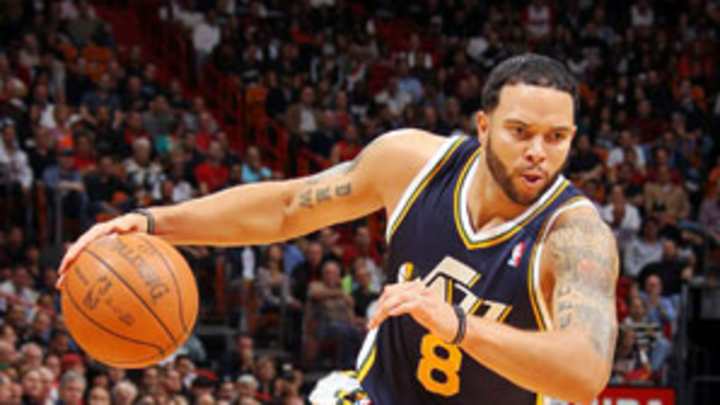Williams trade reflects extreme times in NBA right now

I understand why the Jazz traded Deron Williams to New Jersey for rookie Derrick Favors, point guard Devin Harris (whose arrival will create changes in Utah's offense) and two first-round picks. The Jazz leaders saw LeBron James and Chris Bosh walk out on their former franchises and turn them into high-lottery teams, and then they saw six months of Carmelo Anthony trade talk in Denver, and they wanted to avoid both of those conclusions. Consider how the current marketplace would have treated a small-market team like the Jazz: Based in a city known as one of the least popular destinations for NBA players, the Jazz would've held little leverage while absorbing a national public-relations beating if rumors of a potential departure by Williams had ever gone mainstream.
This trade was a surprise in that Utah had kept the negotiations secret. But in hindsight it wasn't a surprise at all.
The Jazz realized their relationship with Williams was headed toward the same cliff as LeBron, Bosh and Carmelo, and so they decided to make the best of a hopeless future. Will they next seek to move other expensive commitments to Al Jefferson (owed $29 million over the next two years), Paul Millsap ($16.7 million over the next two years) and/or Mehmet Okur ($10.9 million next year) in order to pare down the payroll and ready themselves to exploit the next collective bargaining agreement?
My impression is that the Jazz intend to remain competitive, as opposed to tearing down their roster and starting all over from the bottom. The one variable is Andrei Kirilenko, whose expiring $17.8 million salary could create payroll relief this summer -- though the Jazz haven't dismissed the possibility of re-signing him at a smaller number.
First Jerry Sloan leaves, now Williams is sent away. For two decades we knew who the Utah Jazz were and what they stood for as a franchise. Now we, and they, can have no idea. They can pursue the same objectives as always, but with no certainty of replicating the discipline and excellence that defined them for so long.
Two trends are likely to be set forth by this trade: (1) the Jazz (No. 8 in the West before the Williams trade) will probably fall out of the playoffs without their leading playmaker and scorer, and (2) the owners of the mid- and small-market teams like Utah will be more galvanized than ever to create a system that can enable them to retain their best players.
After years of watching talent seep to the Western conference, the big Eastern markets are now hoarding players before the lockout. The Knicks are suddenly relevant with Carmelo Anthony and Amar'e Stoudemire, while Williams promises to help the Nets challenge the Knicks' ownership of the New York market. Boston, Miami and Chicago are all enormously strong.
A lot of owners can't compete with those franchises. But those frustrated owners are going to have their say at the bargaining table, and the players aren't going to like the potential solutions: A hard salary cap, a franchise tag, salary rollbacks that may unduly affect the richest players.
These are extreme times for the NBA: The imbalance of talent has made the league extremely popular, thanks to the promise of highly-competitive rivalries among the the deeply-stocked contenders at the top of each conference; but it has also made a majority of the owners extremely miserable, because the league is growing popular at their expense.
The biggest cities should grab the best players while they can, because on July 1 the vault slams shut. A new era of parity will come forth, and maybe the Jazz can look forward to the day when they won't have to trade their franchise-defining star.

Senior Writer, Sports Illustrated Sports Illustrated Senior Writer Ian Thomsen, who joined the magazine in 1998, is one of SI's top basketball scribes. Along with writing columns and features for SI, Thomsen is a frequent contributor to SI.com. Before joining SI, Thomsen spent six years in Europe as the sports columnist for the International Herald Tribune, the world's largest international English-language daily. While at the paper Thomsen wrote about an array of sports for a global audience, including the major world and European soccer tournaments, the 1995 Rugby World Cup, Olympic Games, Ryder Cups, Grand Slam tennis events, Grand Prix auto races and, very rarely, cricket. Thomsen, who graduated from Northwestern with a journalism degree in 1983, was a feature writer for The National Sports Daily during its short, expensive run of 1990-91. His first job was with The Boston Globe, where he covered Doug Flutie's Boston College Eagles and all three of the Celtics-Lakers NBA Finals of the 1980s. Thomsen was a feature writer at SI before taking on the NBA beat fulltime in 2000. With Luis Fernando Llosa and Melissa Segura, Thomsen covered the 2001 scandal of overaged Little League pitcher Danny Almonte and wrote the first SI cover story on Kobe Bryant in 1998. Thomsen lives with his wife and two children near Boston.